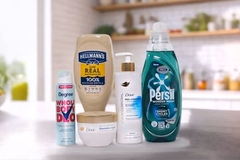US EPA poll sees strong support for adding personal care products to Safer Choice program
03 Jul 2024 --- Through a public poll, the US Environmental Protection Agency (EPA) has found that most surveyed citizens support expanding the Safer Choice program to include personal care products. The program certifies products as free of some of the most toxic chemicals and has received nearly unanimous support for its proposed extension.
“About 99% of comments received were in support of expansion of the Safer Choice and/or Design for the Environment (DfE) programs. About 69% of the comments received were in support of expanding the Safer Choice program into cosmetics,” the summary noted.
According to Toxic-Free Future, more than 4,400 products are currently Safer Choice certified, with over 99% of these products manufactured by 312 US-based companies across 38 states.

Customer and business support
Toxic-Free Future, an advocate for reducing toxic chemicals in products, said it filed formal comments and organized a petition with over 900 signatures supporting the program’s expansion to personal care products.
 Supporters rally for the inclusion of personal care products under the EPA’s Safer Choice program.Additionally, 39 businesses, including major retailers and non-governmental organizations, such as Sephora, Seventh Generation, Beautycounter, the Environmental Working Group and WeACT for Environmental Justice, signed a letter urging the EPA to include cosmetics and personal care products in the Safer Choice certification.
Supporters rally for the inclusion of personal care products under the EPA’s Safer Choice program.Additionally, 39 businesses, including major retailers and non-governmental organizations, such as Sephora, Seventh Generation, Beautycounter, the Environmental Working Group and WeACT for Environmental Justice, signed a letter urging the EPA to include cosmetics and personal care products in the Safer Choice certification.
Liz Hitchcock, federal policy director at Toxic-Free Future’s Safer Chemicals Healthy Families, emphasized the importance of this move: “EPA’s comment summary shows that consumers are looking for safer, non-toxic products and that the overwhelming majority support expanding the successful Safer Choice program to certify the products we use on our families’ bodies.”
Public health and consumer trust
The EPA summary highlights that the Safer Choice program, which certifies “safer” cleaning products, is looking to expand into the personal care industry.
Additionally, it reveals that consumers are growing more skeptical of greenwashing and demanding clarity regarding the safety of the ingredients in the goods they use on a daily basis.
Survey respondents believe that the certification will help consumers find products free of dangerous chemicals like PFAS, which are frequently present in cosmetics and have been connected to a number of health problems, such as cancer, neurotoxicity and endocrine disruption.
The EPA’s proposal comes amid rising concerns about the safety of cosmetic ingredients.
.jpg) EPA’s Safer Choice certification aims to help consumers avoid toxic chemicals like PFAS in everyday products.Commenters pointed out that makeup has a high potential for exposure and that people of all ages and genders increasingly use it on a daily basis. They emphasized that dangerous components, like heavy metals and phthalates, are frequently omitted from product labels, making it challenging for customers to stay away from them.
EPA’s Safer Choice certification aims to help consumers avoid toxic chemicals like PFAS in everyday products.Commenters pointed out that makeup has a high potential for exposure and that people of all ages and genders increasingly use it on a daily basis. They emphasized that dangerous components, like heavy metals and phthalates, are frequently omitted from product labels, making it challenging for customers to stay away from them.
Industry urging EPA action
Toxic-Free Future and other stakeholders are urging the EPA to expand the Safer Choice program to include personal care products and cosmetics.
The comments collected by the EPA underscore a broad consensus on the need for safer personal care products. Expanding the Safer Choice program to include these products would align with federal and state efforts to regulate toxic chemicals and provide a national standard that consumers and businesses can trust.
Expanding Safer Choice certification to cosmetics would also address environmental justice concerns, the EPA summary reveals. Many commenters pointed out that low-income communities and women of color are disproportionately affected by the harmful chemicals found in cosmetics, so they believe Safer Choice certification could help reduce these inequities by promoting products free from harmful chemicals.
Following this, the EPA says it will review the comments and consider expanding the Safer Choice program to include personal care products. This expansion could provide a national pathway for safer consumer choices and support businesses in marketing products with transparent and safe ingredients.
By Venya Patel














